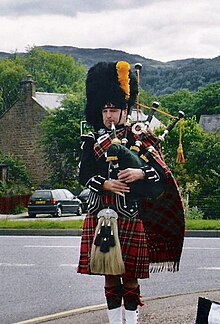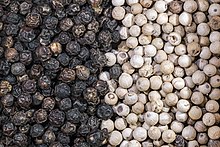piper
English

Etymology 1
From Middle English piper, pipere; equivalent to pipe + -er.
Pronunciation
- Lua error in Module:parameters at line 290: Parameter 1 should be a valid language or etymology language code; the value "UK" is not valid. See WT:LOL and WT:LOL/E. IPA(key): /ˈpaɪ.pə/
- Lua error in Module:parameters at line 290: Parameter 1 should be a valid language or etymology language code; the value "US" is not valid. See WT:LOL and WT:LOL/E. IPA(key): /ˈpaɪ.pɚ/
- Rhymes: -aɪpə(r)
Noun
piper (plural pipers)
- A musician who plays a pipe.
- A bagpiper.
- A baby pigeon.
- A common European gurnard (Trigla lyra), having a large head, with prominent nasal projection, and with large, sharp, opercular spines.
- A sea urchin (Goniocidaris hystrix) with very long spines, native to the American and European coasts.
Synonyms
Derived terms
Translations
|
Etymology 2
(deprecated template usage) [etyl] Latin
Noun
piper
Anagrams
Aromanian
Alternative forms
Etymology
From (deprecated template usage) [etyl] Greek πιπέρι (pipéri), from (deprecated template usage) [etyl] Ancient Greek πέπερι (péperi).
Noun
piper m
Derived terms
See also
Latin

Etymology
Borrowed from Ancient Greek πέπερι (péperi, “pepper”), via Middle Persian from an Indo-Aryan source, ultimately from Sanskrit पिप्पलि (pippali, “long pepper”).
Pronunciation
- (Classical Latin) IPA(key): /ˈpi.per/, [ˈpɪpɛr]
- (modern Italianate Ecclesiastical) IPA(key): /ˈpi.per/, [ˈpiːper]
Noun
piper n (genitive piperis); third declension
Declension
Third-declension noun (neuter, imparisyllabic non-i-stem).
| Case | Singular | Plural |
|---|---|---|
| Nominative | piper | pipera |
| Genitive | piperis | piperum |
| Dative | piperī | piperibus |
| Accusative | piper | pipera |
| Ablative | pipere | piperibus |
| Vocative | piper | pipera |
Derived terms
Related terms
Descendants
- Dalmatian: pepro
- Friulian: pevar
- Galician: prebe
- Italian: pepe
- Lombard: pever
- Norman: (Jersey) paîvre
- Old Occitan:
- Old French: peivre
- Middle French:
- French: poivre
- Middle French:
- Old Spanish:
- Spanish: pebre
- Romansch: paiver, peiver, pever
- Sardinian: pibere, pibiri, pipere
- Sicilian: pipi
- Venetian: pévaro
- → English: piper
- → Old Dutch: *pipar, *pepar
- → Old High German: pfeffar, pfeffur
- → Old Irish: pipur
- → Old Norse: piparr
- → Proto-Slavic: *pьpьrь (see there for further descendants)
- → West Germanic: *piper
References
- “piper”, in Charlton T. Lewis and Charles Short (1879) A Latin Dictionary, Oxford: Clarendon Press
- “piper”, in Charlton T. Lewis (1891) An Elementary Latin Dictionary, New York: Harper & Brothers
- piper in Gaffiot, Félix (1934) Dictionnaire illustré latin-français, Hachette.
- “piper”, in Harry Thurston Peck, editor (1898), Harper's Dictionary of Classical Antiquities, New York: Harper & Brothers
- “piper”, in William Smith et al., editor (1890), A Dictionary of Greek and Roman Antiquities, London: William Wayte. G. E. Marindin
Middle English
Etymology 1
From Old English pipor.
Noun
piper
- Alternative form of peper
Etymology 2
From Old English pīpere; equivalent to pipe + -er; compare Old Norse pípari and Old High German pfīfari.
Alternative forms
Pronunciation
Noun
piper (plural pipers)
- A piper; one who plays a pipe.
Descendants
References
- “pīper(e (n.)”, in MED Online, Ann Arbor, Mich.: University of Michigan, 2007, retrieved 2018-12-07.
Norman
Verb
piper
- (Jersey, onomatopoeia) to peep
Norwegian Bokmål
Noun
piper m or f
- indefinite plural of pipe
Norwegian Nynorsk
Noun
piper f
- indefinite plural of pipe
Old English
Pronunciation
Noun
piper m
- Alternative form of pipor
Romanian

Etymology
From Bulgarian пипе́р (pipér), from Proto-Slavic *pьpьrь, from Latin piper, from Ancient Greek πέπερι (péperi), from Sanskrit पिप्पलि (pippali).
Noun
piper m
See also
Swedish
Verb
piper
- (deprecated template usage) present tense of pipa.
West Frisian
Etymology
(This etymology is missing or incomplete. Please add to it, or discuss it at the Etymology scriptorium.)
Noun
piper c (plural pipers, diminutive piperke)
- pepper (spice)
Further reading
- “piper”, in Wurdboek fan de Fryske taal (in Dutch), 2011
- English terms inherited from Middle English
- English terms derived from Middle English
- English terms suffixed with -er
- English 2-syllable words
- English terms with IPA pronunciation
- Rhymes:English/aɪpə(r)
- English lemmas
- English nouns
- English countable nouns
- English terms derived from Latin
- English nouns with unknown or uncertain plurals
- English archaic forms
- en:Musicians
- en:People
- en:Pigeons
- Aromanian terms derived from Greek
- Aromanian terms derived from Ancient Greek
- Aromanian lemmas
- Aromanian nouns
- Aromanian masculine nouns
- Latin terms borrowed from Ancient Greek
- Latin terms derived from Ancient Greek
- Latin terms derived from Middle Persian
- Latin terms derived from Indo-Aryan languages
- Latin terms derived from Sanskrit
- Latin 2-syllable words
- Latin terms with IPA pronunciation
- Latin lemmas
- Latin nouns
- Latin third declension nouns
- Latin neuter nouns in the third declension
- Latin neuter nouns
- la:Spices and herbs
- Middle English terms inherited from Old English
- Middle English terms derived from Old English
- Middle English lemmas
- Middle English nouns
- Middle English terms suffixed with -er
- Middle English terms with IPA pronunciation
- Norman lemmas
- Norman verbs
- Jersey Norman
- Norman onomatopoeias
- Norwegian Bokmål non-lemma forms
- Norwegian Bokmål noun forms
- Norwegian Nynorsk non-lemma forms
- Norwegian Nynorsk noun forms
- Old English terms with IPA pronunciation
- Old English lemmas
- Old English nouns
- Old English masculine nouns
- Romanian terms borrowed from Bulgarian
- Romanian terms derived from Bulgarian
- Romanian terms derived from Proto-Slavic
- Romanian terms derived from Latin
- Romanian terms derived from Ancient Greek
- Romanian terms derived from Sanskrit
- Romanian lemmas
- Romanian nouns
- Romanian masculine nouns
- Swedish non-lemma forms
- Swedish verb forms
- West Frisian lemmas
- West Frisian nouns
- West Frisian common-gender nouns
- fy:Spices